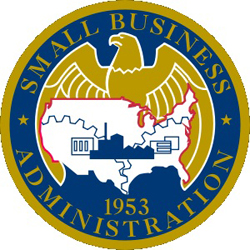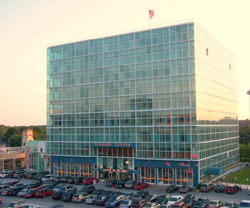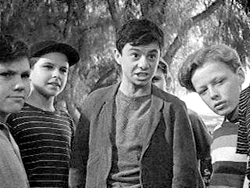Federal Workers at SBA Office Knew How to Fleece Uncle Sam
By James Hufnagel
(Editor’s note: The author and the editor wish to convey that it has been their experience that not all SBA employees exhibited the outrageous behaviors mentioned in the story.)
Back in the early 1990's, I was a federal worker employed by the Small Business Administration at its Niagara Falls office. At the time, the SBA occupied two floors at the Occidental building located next to the Rainbow Bridge. Years later, the "Oxy Center," as it was affectionately called by Niagara Falls residents, would become the present-day One Niagara.
The SBA maintained a presence here in Niagara Falls because then-Congressman John J. LaFalce was chairman of the House Small Business Committee, and directing 200 or so federal jobs to his district was the way things were done. When LaFalce retired from Congress, the entire operation packed up and moved to Erie County.
Well, they didn't actually "pack up," but we'll get to that later.
The local SBA was one of four "Disaster Area Offices" in the country. In fact, these four offices comprised a small subsection of the entire SBA, whose mission was to make loans to small businesses in normal, everyday, non-disaster situations.
When a disaster struck somewhere on the eastern seaboard, our office would gear up, hire loan officers and other support personnel, set up temporary offices at the disaster site, and begin accepting and processing applications for subsidized, low-interest government loans.
Generally given to spending a fair amount of time thinking about economic and business matters, I held certain ideas concerning the wisdom of maintaining a vast federal bureaucracy dedicated to providing a financial service that the private sector does much better – in essence competing with them - but when you're making good money at a government job, you keep your mouth shut.
Typical was one trip I made to the New Jersey shoreline, portions of which were declared disaster areas because of storm activity. We loaded trucks at Niagara Falls with computers, printers and servers, drove all night to New Jersey, and spent several days setting up temporary offices in rented space.
We got a per diem to pay for food and the hotel rooms in which we stayed. After a couple of days, I noticed that most of the staff, who had been with the agency for a few years, were no longer at the hotel with us. "Oh, they rent cheap rooms at boarding houses for a fraction of the cost of the hotel," I was told, "and pocket the difference." On top of hardship pay for working out-of-town, it amounted to a pretty good bonus.
So we set up this temporary office with a server, printers and about 20 computer work-stations equipped with telephones and waited for the onslaught of calls from small businesses that had suffered from the disaster. And waited. And then waited some more.
Finally, the loan officers were instructed to start calling small businesses from the phone book. Their conversations went more or less like this: "Hi. I'm calling from the government. Do you need a low-interest disaster loan? You don't? Are you sure you wouldn't want a loan?"
After about two months of this nonsense, I found out that the office had processed about two dozen loans. Imagine how much per loan this operation cost the taxpayers.
I have more horror stories from my employment with the federal government. When the first President Bush was trying to get re-elected in 1992 in the midst of a recession, one of the ways he tried to stimulate the economy was to give free rein to government agencies to go on spending sprees. We filled a large conference room to the ceiling with scores of new Hewlett-Packard computers and laser printers for which we had absolutely, positively, no use whatsoever.
Then there were the months we spent wiring computer communications for the entire second and third floors of the Oxy building. Much of this was done on weekends so as to complete the project as soon as possible, and we got paid overtime. Funny thing was, we continually encountered unforeseen difficulties, resulting in delay after delay, with the side effect of creating more overtime. My supervisor would arrive at 8 a. m. on Saturdays, spend 10 minutes nodding approvingly, cheering us with a "Well done, fellows, carry on!" and then leave for the day. He'd still put in for eight hours of overtime. How do I know this? He bragged about it.
Some years later, I had the opportunity to explore the second and third floors where I used to work, just for kicks. Those floors of the Oxy building had a kind of eerie, abandoned, ghost-town feeling. Imagine that at the factory or office where you work, people were told they had 10 minutes to leave, and they did. When the SBA moved out of the Oxy building, they left practically everything behind. Desks and office chairs, tables, filing cabinets, telephones, row upon row of cubicles complete with partitions, shelving and drawers remained. Tens, maybe a couple of hundred thousand dollars’ worth of office equipment simply left behind when the SBA moved out. Your tax dollars at work.
Speaking of your tax dollars at work, somewhere in Albany, a State Parks employee, specializing in social media, recently "unfriended" me from the Facebook pages "Niagara Falls State Park, USA" and "New York State Parks and Historic Sites." Apparently, it was State Parks’ idea of retaliation for articles critical of the agency which appeared in this newspaper. At least that individual is busy doing something, as opposed to the State Parks work crews who appear to be on perpetual break every time you see them at any one of numerous parks up and down the Niagara River. Some things never change.
Editor’s note: When I was the managing member of the One Niagara building, I oversaw the move by the SBA that Mr. Hufnagel refers to in his story. While the SBA employees did not bother to clean up their debris and garbage, for some reason, a certain group of SBA employees were fastidious about filling up large boxes and carefully placing them on the loading dock, as they said, for removal as garbage.
For some days this had been going on: the careful placing of boxes of garbage to be removed by SBA employees for disposal.
It struck me as odd, so I finally halted the procedure and took possession of the last 10 boxes. They were filled with clean paper debris. I pushed some of it aside and found in each box, buried within, not unlike the prize you find in a Cracker Jack box, a brand new flat screen computer monitor worth about $200 each.
How many boxes went out the door before I halted the theft is impossible to know.
The people involved in this theft were well-paid government employees, who apparently thought nothing of stealing from the government. Perhaps it was not unlike the boy who saw his friend steal an apricot from a farmer’s tree, and asked, “What are you going to say about this in Sunday school?”
The boy who swiped the apricot answered, “Stealing apricots ain’t like stealing in the Bible.”
Maybe these SBA employees felt that stealing from a wasteful government wasn’t stealing at all. It was just fruit, ripe for the taking. In a world of government waste, it will only be wasted elsewhere, so why should it not be utilized by thee and me? --FRP





